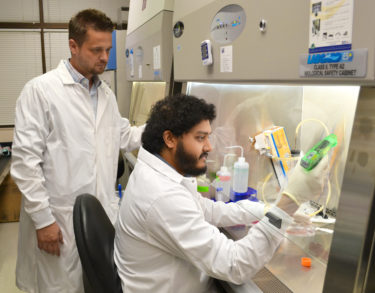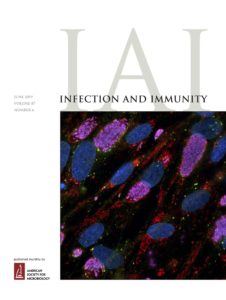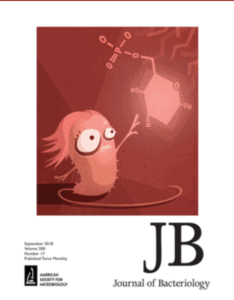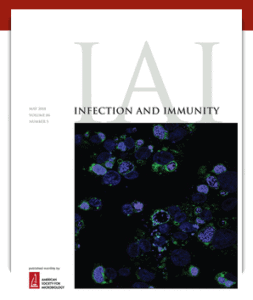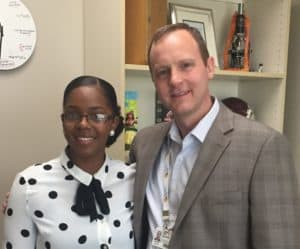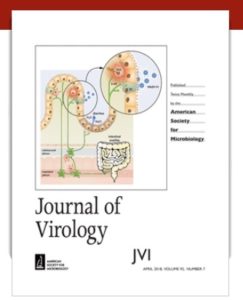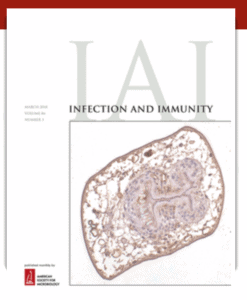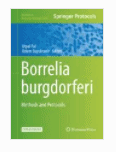December 2020
December MBIM Employee Spotlight – Sandra Morrison
November 2020
November MBIM Employee Spotlight – Aura Ramirez
October 2020
October MBIM Employee Spotlight – Srijon Banerjee
A big congratulations to Dr. Cannon on his new paper with colleagues from the Mayo Clinic in Nature Communications entitled “Th17-inducing autologous dendritic cell vaccination promotes antigen-specific cellular and humoral immunity in ovarian cancer patients”!
Kudos to Joseph Bryant and the Jorgenson Laboratory on their new paper “A genetic screen to identify factors affected by undecaprenyl phosphate recycling uncovers novel connections to morphogenesis in Escherichia coli” in Molecular Microbiology!
Excited to share a newly funded project between the Boehme and Forrest Laboratories and Dr. Wendy Nembhard in the UAMS College of Public Health! https://news.uams.edu/2020/10/08/uams-researchers-awarded-1-3-million-to-conduct-sars-cov-2-serological-study-in-arkansas/
Congrats to Shana Owens and the Forrest Laboratory on their new paper “Deletion of Murine Gammaherpesvirus Gene M2 in AID-Expressing B Cells Impairs Host Colonization and Viral Reactivation” in the Journal of Virology!
September 2020
September MBIM Employee Spotlight – Clay Jackson-Litteken
August 2020
Kudos to Changoon Oh and Ambika Verma from the Aachoui Laboratory on their new review “Caspase-11 non-canonical inflammasomes in the lung” in Frontiers in Immunology!
Our new MBIM Employee Spotlight Series- August spotlight features our new faculty, Dr. Lu Huang and Dr. Mark Manzano. Huang Spotlight – Aug2020 Manzano Spotlight – Aug2020
July 2020
Congrats to the Changhoon Oh, Ambika Verma, and the Aachoui Laboratory on their new publication, “Neutrophil Caspase-11 Is Essential to Defend against a Cytosol-Invasive Bacterium” in Cell Reports!
MBIM was recognized in July’s Accolades from College of Medicine Dean Chris Westfall for efforts to help the UAMS Department of Pathology with COVID-19 testing. The testing was Led by Dr. Blevins and co-director Dr. Voth. Those that helped included faculty members Jason Stumhofer, Tiffany Weinkopff, and Lu Huang., postdocs Amanda Dragan (Voth Lab), Srijon Bannerjee (Pechous Lab), and Gopinath Verungopal (Weinkopff Lab), graduate students Clay Jackson-Litteken (Blevins Lab) and Samantha Crane (Pechous Lab), and staff member Sandra Morrison (Morrison Lab). They have tested more than 3100 samples since the laboratory started in April!
Congratulations to Dr. Liu on her promotion to Associate Professor with tenure and to Dr. Lee Soderberg on his promotion to Emeritus Professor!
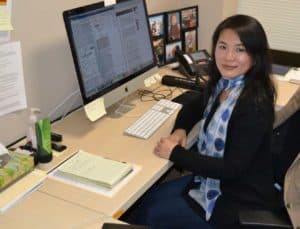

Great job by Catherine Lee from the Voth Laboratory on successfully defending her Master’s thesis! Congratulations!
June 2020
May 2020
Congratulations to Shana Owens from the Forrest Laboratory on successfully defending her doctoral dissertation! Job well done, Dr. Owens!
April 2020
Kudos to Leah Latham (a recent MBIM graduate) and the Stumhofer Laboratory on their publication “ICOS signaling promotes a secondary humoral response after re-challenge with Plasmodium chabaudi chabaudi AS” in PLoS Pathogens!
Congrats to Shana Owens and Aru Gupta from the Forrest Lab on their new co-authorship paper, “R-loop-forming Sequences Analysis in Thousands of Viral Genomes Identify A New Common Element in Herpesviruses“, with the Nookaew Lab in Biomedical Informatics!
Congratulations to Kate Brann from the Voth Lab on successfully defending her doctoral dissertation entitled “Characterizing the human macrophage response to diverse bacterial pulmonary pathogens! Way to go, Dr. Brann!!!
Kudos to Dr. Kate Brann and Marissa Fullerton from the Voth Lab on their new publication “Coxiella burnetii requires host eukaryotic initiation factor 2α activity for efficient intracellular replication” in Infection & Immunity!
Congrats to Shana Owens from the Forrest Laboratory on being named a Health Sciences Innovation and Entrepreneurship Scholar by the UAMS Translational Research Institute! Way to go Shana!
March 2020
Kudos to the Pechous Laboratory on their paper “A dual role for the Plasminogen activator protease during the pre-inflammatory phase of primary pneumonic plague” in the Journal of Infectious Diseases!
February 2020
Congratulations to the Li Laboratory on their paper “Antibody, but not B cell-dependent antigen presentation, plays an essential role in preventing Chlamydia systemic dissemination in mice” in the European Journal of Immunology!
January 2020
We are pleased to welcome new MBIM Graduate Students to the Department! First-year GPIBS graduate students Naiha Ahmad (Liu Laboratory), Ana Castro (Weinkopff Laboratory), Dylan Gilbreath (Blevins Laboratory), Maple Guo (Blevins Laboratory), Brandon Hogland (Aachoui Laboratory) and Miguel Mercado (Li Laboratory) joined the Microbiology & Immunology Track.
November 2019
Kudos to Joe Rom and the Smeltzer Laboratory on their paper “The impact of msaABCR on sarA-associated phenotypes is different in divergent clinical isolates of Staphylococcus aureus” in Infection & Immunity!
Congrats to Aura Ramirez and the Smeltzer Laboratory on their new publication, “Exploiting correlations between protein abundance and the functional status of saeRS and sarA to identify virulence factors of potential importance in the pathogenesis of Staphylococcus aureus osteomyelitis” in ACS Infectious Diseases!
October 2019

A tremendous honor was bestowed upon our own Dr. Mark Smeltzer as he was invested as the UAMS Chair in Sciences Basic to Medicine. This Endowed Chair is a well-deserved honor recognizes his contributions to research, training, and education. Congratulations Dr. Smeltzer! Read the full story: https://news.uams.edu/2019/10/30/mark-smeltzer-ph-d-invested-in-chair-in-sciences-basic-to-medicine/
Congratulations to the MBIM students who received awards at the UAMS Graduate Student Association symposium! Shana Owens from the Forrest Lab placed 2nd in the oral presentation category. Dina Zita from the Boehme Lab received 2nd place in the poster competition.
Exciting funding news for Dr. Smeltzer and his team, as they arepart of a new Department of Defense grant at UALR to study bone regeneration! Read the whole story here: https://ualr.edu/news/2019/10/24/bone-regeneration-dod-grant/
Kudos to the Lee laboratory on their new paper “MgrA negatively impacts Staphylococcus aureus invasion by regulating capsule and FnbA” in Infection & Immunity!

This month our Program Coordinator Lisa Smith was the focus of the College of Medicine’s Up Close and Amazing profile! https://research.uams.edu/meet-lisa-smith/
Kudos to Amanda Dragan and Dan Voth on their review article “Coxiella burnetii: International Pathogen of Mystery” in Microbes and Infection
September 2019
On September 19, we hosted the inaugural Marie Chow Symposium in honor of our former faculty member, Dr. Marie Chow. The keynote address was given by one of her trainees, Dr. Pranav Danthi, from Indiana University and included talks from students in the department. Here are a few pictures from the event:
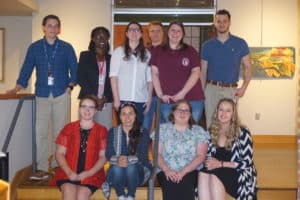
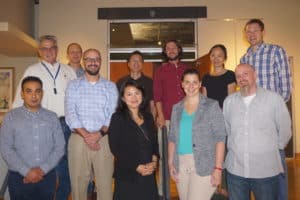
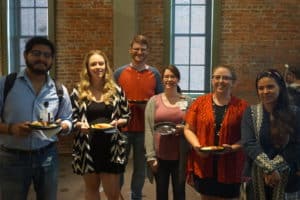


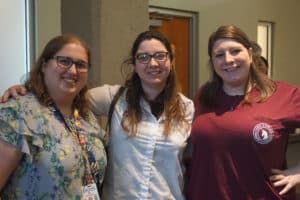
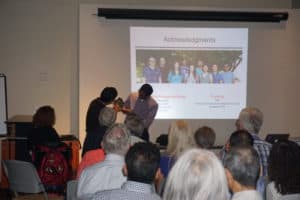
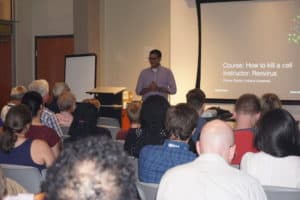
Kudos to the Blevins Laboratory on their new co-author publication, “The RpoS Gatekeeper in Borrelia burgdorferi: An Invariant Regulatory Scheme That Promotes Spirochete Persistence in Reservoir Hosts and Niche Diversity” in Frontiers in Microbiology!
Congrats to Matt Jorgenson and Kevin Young on their new paper, “YtfB, an OapA Domain-Containing Protein, Is a New Cell Division Protein in Escherichia coli“, in the Journal of Bacteriology!
Welcome the new Microbiology & Immunology graduate students! We are excited to start working with a new crop of trainees! Here are a few pictures from the reception.
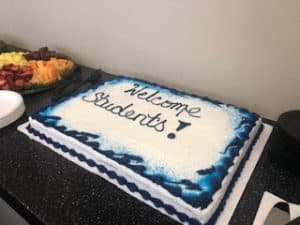
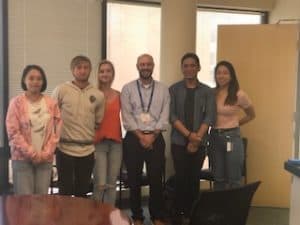
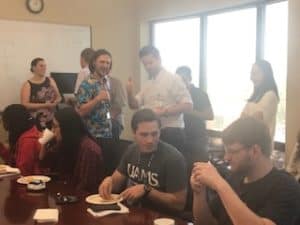

Awesome new work from the Weinkopff laboratory, “Leishmania infection induces macrophage VEGF-A production in a ARNT/HIF-dependent manner“, was published in Infection and Immunity!
August 2019

Give a HUGE CONGRATS to Dr. Liu for her selection as the Community Champion of the year by the Arkansas Ovarian Coalition! It’s awesome how Dr. Liu has engaged the community through this group.
Congrats to Clay Jackson-Litteken and the Blevins Lab on their new publication “Assessing the Contribution of an HtrA Family Serine Protease During Borrelia turicatae Mammalian Infection” in Frontiers in Cellular and Infection Microbiology!
Kudos to Srijon K. Banerjee and the Pechous Laboratory on having an image from their paper selected as the cover art for the latest issue of Infection and Immunity! https://iai.asm.org/content/87/8.cover-expansion
June 2019
We are excited to report a new paper from the Lee laboratory, “Contribution of hla regulation by SaeR to Staphylococcus aureus USA300 Pathogenesis“, in Infection and Immunity!
Congratulations to Dr. Tiffany Weinkopff on receiving a 2019-2020 Oak Ridge Associated Universities Ralph E. Powe Junior Faculty Enhancement Award!
Kudos to the Pechous Laboratory on a new book chapter entitled “Intranasal Inoculation of Mice with Yersinia pestis and Processing of Pulmonary Tissue for Analysis” in Methods in Molecular Biology!
May 2019
Lab’s Work on Plague Published in Infection and Immunity
May. 23, 2019 | Roger D. Pechous, Ph.D., studies the bacteria that caused the infamous black death of the Middle Ages, shedding light on something old to potentially protect against something new: bioterrorism. The University of Arkansas for Medical Sciences (UAMS) researcher’s latest work has been published in Infection and Immunity.
Pechous is an assistant professor in the Department of Microbiology and Immunology in the UAMS College of Medicine. The article, titled “Modeling Pneumonic Plague in Human Precision-cut Lung Slices Highlights a Role for the Plasminogen Activating Protease in Facilitating Type 3 Secretion,” has been published online in advance of the August print edition of the journal.
The bacterium is called Yersinia pestis. Pechous and Srijon Banerjee, a postdoctoral fellow in Pechous’ lab, study pneumonic plague, the severe lung infection caused by Yersinia pestis as it spreads from human to human through inhalation. The World Health Organization (WHO) classifies pneumonic plague among the world’s deadliest infectious diseases. When the bacterium is spread by fleas, it is known as bubonic plague. Plague in the bloodstream is called septicemic plague.
“Y. pestis was responsible for three major pandemics in recorded history and continues to be a potential threat worldwide, primarily due to concerns of its release as a weapon of bioterror,” Pechous said. “Human-to-human transmission of plague occurs via the lungs, and is almost always lethal in the absence of timely treatment.”
Banerjee said death from pneumonic plague typical occurs in four to seven days. If antibiotics are not administered within 24 hours of symptom development, it is nearly 100% fatal. It is one of the deadliest bacteria known to man.
“What was unique about this study was its use of real human donor lung tissue, prepared to maintain realistic lung function in the laboratory setting,” Banerjee said. “This allowed us to observe the way Y. pestis would behave in a living human lung and see what makes it so successful at overwhelming its human host.”
Human lung tissue is cut into slices for the experiments in the Lung Cell Biology Laboratory at the Arkansas Children’s Research Institute by coauthor Richard C. Kurten, Ph.D., a professor of physiology & biophysics and pediatrics at UAMS. Kurten routinely acquires lungs from organ transplant donors and processes them for use in research in his laboratory and those of collaborators at UAMS and across the country.
From watching the behavior of Y. pestis in the lung slices in the lab, the researchers were able to pinpoint exactly how the bacteria quickly gains the upper hand.
“We show that Y. pestis hones in on a key cell type and delivers key proteins that interfere with its ability to control infection and initiate an immune response,” Pechous said. “We identify a protein on the surface of Y. pestis that is critical for directing Y. pestis to specifically target this cell type to establish infection.”
“All of this happens quickly,” Banerjee said. “By the time other signals alert the immune system to the severity of the infection, it’s too late. Ultimately, your own immune response is what ends up compromising lung function and leading to death.”
Understanding this process has applications for pneumonic plague and beyond.
For one, it’s important to better understand how Y. pestis functions, so scientists can develop better treatments for the highly contagious infectious disease. While rare today in humans, plague continues to be carried in animals and fleas, from which it can spread to humans.
For example, a 2016 outbreak in Madagascar infected 62 people, killing 26, according to the WHO. Another Madagascar outbreak in 2017 infected 2,348 people, causing 202 deaths. In the United States, the Centers for Disease Control reports an average of 1-17 cases per year, mostly in the West, where the disease is carried by rodents.
In addition, the progression of Y. pestis infection in the lungs mimics other lung infections, like severe pneumonia, but on a much faster scale. More broadly, understanding the bacterium helps scientists and public health officials plan for containing disease outbreaks. The research could also lead to the development of alternative treatments, which could be useful if the bacterium ever becomes resistant to antibiotics.
Pechous earned his doctorate from the Medical College of Wisconsin and completed postdoctoral training at the University of North Carolina at Chapel Hill. He has been studying bacterial infection since 2001. Banerjee earned his Ph.D. from the University of Calcutta in India.
The Pechous lab is another successful example from the UAMS Center for Microbial Pathogenesis and Host Inflammatory Responses, directed by Mark Smeltzer, Ph.D. The center has earned $21 million in funding through the NIH’s Centers of Biomedical Research Excellence (COBRE) program, which aims to provide funding and mentoring to researchers who are early in their careers. Its participants are studying viruses, malaria, cancer, Lyme disease and chlamydial infection. Pechous’ work is funded by the center and a grant from the NIH National Institute of Allergy and Infectious Diseases.
UAMS has six COBRE centers, which are launching new scientific careers, attracting top talent and creating concentrations of expertise on topics like neuroscience, cancer therapy, childhood obesity prevention and pediatrics.
In order to study Y. pestis at UAMS, the Pechous lab uses strict containment facilities and security procedures.
Infection and Immunity is a prestigious peer-reviewed journal published by the American Society for Microbiology that reports key discoveries that help microbiologists, immunologists, epidemiologists, pathologists and clinicians gain new insights into the underlying mechanisms of host-pathogen interactions and develop novel strategies to prevent or treat infectious diseases.
Kudos to Amanda Dragan from the Voth Laboratory for having an image from her paper selected for the cover of the current issue of Infection and Immunity!
Congratulations to our 2019 Graduates!
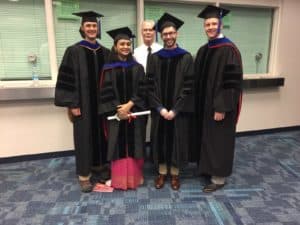
Pictured: Craig Forrest, Aru Gupta, Kevin Young, William MacCain, Karl Boehme
Congratulations to Srijon Banerjee and the Pechous Laboratory on their new publication, “Modeling pneumonic plague in human precision-cut lung slices highlights a role for plasminogen activating protease in facilitating type 3 secretion” in Infection & Immunity!
April 2019
New book chapter from the Liu Laboratory, “Poxviruses as gene therapy vectors: Generating poxvirus vectors expressing therapeutic trans genes” in the Methods in Molecular Biology book series.
A belated congratulations to Bernice Nounamo and Steven Conrad from the Liu Laboratory who received a Student Travel Award from the American Society for Virology to attend their Annual Meeting in College Park, MD.
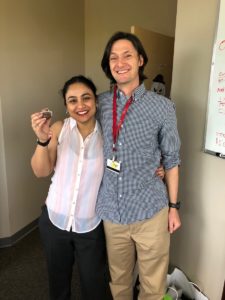
Congratulations to Aru Gupta from the Forrest Laboratory on successfully defending her doctoral dissertation entitled “Roles of viral immediate early genes in gammherpesviurs pathogenesis”. Job well done, Dr. Gupta!
Researcher Granted $1.86 Million to Study Poxvirus
April 15, 2019 | The poxvirus — with its applications for the investigation of disease development, cross-species infection-caused diseases, vaccine development and cancer virotherapy — is the focus of research by Jia Liu, Ph.D., who has received a $1.86 million grant from the National Institutes of Health to continue this innovative work at the University of Arkansas for Medical Sciences (UAMS).
The grant is from the National Institute of Allergy and Infectious Diseases and will support Liu’s work for five years. Liu is an assistant professor in the Department of Microbiology and Immunology in the UAMS College of Medicine. She will be studying the poxvirus on the molecular level and how the disease develops.
Poxviruses belong to a virus family that includes smallpox. A specific poxvirus that can only infect rabbits, called myxoma virus (MYXV), became particularly interesting to scientists since the 1950s because the virus was used in Australia and Europe as a biological weapon against a species of rabbits called European rabbits. The rabbits were overly abundant and destroying crops. Because MYXV was new to the European rabbits, they had no resistance against its infection.
Initially, the virus worked, cutting the rabbit population by 99 percent. However, within a decade, the rabbits had adapted to develop resistance to the MYXV infection and their numbers were on the rise again. Meanwhile, the virus was also changing. The incident gave scientists a real-world chance to watch a deadly pathogen (the virus) and its host (the rabbits) adapt in an arms-race fight for the upper hand.
“It’s a dramatic example of virus-host interactions and similar events can be happening in our bodies constantly,” Liu said. “We are surrounded by microbes all the time. So why don’t we get sick constantly? It has to do with the host’s natural immune response, which forms a formidable barrier against pathogens. However, there are critical gaps in our knowledge about how it protects us from things like viral infections. More importantly, once we learn how our immune system works, we can train them to eliminate malignancies like cancer.”
With this specific grant, Liu will study the gene function of (sterile α motif domain-containing protein 9, or SAMD9), which was discovered as recently as 2006 to be important for human health. It is now realized that SAMD9 protein is both critical in immune responses against a broad range of viruses and in inhibiting cancer cells from arising.
With this five-year phase of funding, Liu’s goals are to understand how SAMD9 contributes to host immunity, how SAMD9 can be blocked by MYXV, and how SAMD9 can play a role in preventing a pathogen from spreading from one species to another.
Understanding these details of host immunity and host-virus interactions is important for many reasons. In this globally connected world, outbreaks of diseases, especially those that are new to a population — like MYXV was to the European rabbits — can be devastating. Diseases in one species that adapt to attack a new species are of particular concern. Global health crises like bird and swine flu, severe acute respiratory syndrome (SARS), and Ebola viruses are examples.
Vaccines are a main line of defense against viral pathogens and work by awakening the immune system. Better understanding this dynamic through work like Liu’s will improve the ability to develop effective vaccines and keep up with the ever-changing adaptations in both hosts and pathogens.

Additionally, Liu’s work could ultimately improve cancer treatments. Many of the advances that led to modern immunotherapies in cancer began with molecular-level research like hers. Oncolytic immune-virotherapy is a novel concept that introduces viruses that can directly kill cancer cells and activate and usher the host’s immune system to attack cancer cells.
“Many believe the future of such therapies for cancer lies in viruses such as MYXV that do not cause diseases in humans,” Liu said. “If we can come to a clear understanding of how viruses such as MYXV interact with human immune system, we could confidently use these them in cancer treatments for humans, perhaps providing a better option than what is currently available.”
Liu’s story is another successful example from the UAMS Center for Microbial Pathogenesis and Host Inflammatory Responses, directed by Mark Smeltzer, Ph.D. The center has earned $21 million in funding through the NIH’s Centers of Biomedical Research Excellence (COBRE) program, which aims to provide funding and mentoring to researchers who are early in their careers. Liu was supported by the center for the first three years of her research since she joined UAMS in 2013.
UAMS has six COBRE centers, which are launching new scientific careers, attracting top talent and creating concentrations of expertise on topics like neuroscience, cancer therapy, childhood obesity prevention and pediatrics.
March 2019
UAMS’ Daniel Voth, Ph.D., Appointed Interim Chair of Microbiology & Immunology
Daniel Voth, Ph.D., has been appointed interim chair of the Department of Microbiology and Immunology in the University of Arkansas for Medical Sciences (UAMS) College of Medicine, effective following the July 31 retirement of current chair Kevin Young, Ph.D.

Voth has made numerous contributions to the College of Medicine and faculty throughout UAMS in addition to his field of research since his recruitment to the Department of Microbiology and Immunology in 2009. His research leadership posts have included chairing the UAMS Institutional Biosafety Committee since 2014 and serving on the committee that conducted the search for the next UAMS vice chancellor for research, Shuk-Mei Ho, Ph.D., who will join UAMS in May.
“Dr. Voth will bring strong leadership skills, collegiality and dedication to our institution to this new role,” UAMS Executive Vice Chancellor and College of Medicine Dean Christopher T. Westfall, M.D., FACS, said in a March 4 announcement to faculty.
As chair of the UAMS Academic Senate in 2016-2017, Voth worked to enhance faculty life across campus and ensure that faculty concerns were addressed quickly and efficiently to best serve the education, research and clinical missions of UAMS. During this time he also served on the committee that conducted the successful search for Chancellor Cam Patterson, M.D., who joined UAMS last June. Voth was promoted to associate professor in 2014 and has been approved for promotion to professor on July 1.
Voth’s research has focused on strategies used by bacterial pathogens to manipulate human cells and cause disease. He completed his doctoral research at the University of Oklahoma, where he studied the impact of bacterial toxins on eukaryotic cell signaling. Voth’s postdoctoral research at the National Institutes of Health (Rocky Mountain Laboratories, Hamilton, Montana) and his ongoing research at UAMS have focused on the causative agent of human Q fever, Coxiella burnettii.
Voth’s host-pathogen research has been published in 43 peer-reviewed articles and invited reviews to date and has been funded with over $4 million in continual funding from the NIH through various grant mechanisms during his time at UAMS. Voth and his colleagues currently are using novel human-derived lung infection systems to define the pulmonary innate immune response to Staphylococcus aureus.
Voth has mentored numerous graduate students and postdoctoral fellows and has lectured extensively in graduate and medical school courses at UAMS. He directed the Microbiology and Immunology graduate program for four years and served on the UAMS Graduate Council for three years. Voth has also worked to increase diversity in science, participating in the Initiative for Maximizing Student Development program and the Summer Undergraduate Research Program to Increase Diversity in Research. In addition to mentoring students, he currently serves on the mentoring committees of three faculty members.
Congratulations to the Microbiology & Immunology Students who racked up the awards at this week’s UAMS Student Research Day! Joe Rom tied for 2nd place Overall poster and tied for 1st place Graduate School poster. Samantha Huckuntod & Shana Owens tied for second place Graduate School Poster. Great job by the MBIM trainees!
February 2019

Congratulations to the Liu Laboratory on their R01 grant “Studies in poxvirus evasion of the SAMD9 pathway” from the NIH (NIAID)!
Kudos to Amanda Dragan from the Voth Laboratory for winning a travel award to the ASM Biothreats Conference!
January 2019

Congratulations to the Forrest Laboratory on their R21 grant “Defining the efficacy of replication-dead viruses as gammaherpesvirus vaccines” from the NIH (NIAID)!
Check out the spotlight piece from the UAMS Winthrop P. Rockefeller Cancer Institute featuring Dr. Craig Forrest!
October 2018
New work from the Smeltzer Lab was published in the Journal of Proteome Research! https://www.ncbi.nlm.nih.gov/pubmed/30209945
Congratulations to Kate Brann from the Voth Lab on receiving a travel award for her oral presentation at the International Conference on Gram Positive Pathogens in Omaha, NE!
September 2018

Congratulations to Dr. Kevin Young on his election as an American Academy for Microbiology Fellow by the American Society for Microbiology!
We would like to welcome Dr. Youssef Aachoui as the newest member of the faculty in the Department of Microbiology & Immunology! Dr. Aachoui joins us from the University of North Carolina-Chapel Hill where he trained with Dr. Ed Miao and studied inflammasome biology. Welcome, Dr. Aachoui!
August 2018
Congratulations to Amanda Dragan (Voth Lab), Samantha Huckuntod (Pechous Lab), Aura Ramirez (Smeltzer Lab), and Marcelle Dina Zita (Boehme Lab) on passing their qualifying exams!
Congrats to the Lee Laboratory on the publication of their paper “Repression of capsule production by XdrA and CodY in Staphylococcus aureus” in the Journal of Bacteriology!
Job well done by William MacCain and the Young Laboratory on the publication of their paper “A defective undecaprenyl pyrophosphate synthase induces growth and morphological defects that are suppressed by mutations in the isoprenoid pathway of Escherichia coli” in the Journal of Bacteriology!
July 2018

Congratulations to the Stumhofer and Forrest Laboratories on their R21 grant “Understanding the contribution of atypical B cell progenitors to the humoral response” from the NIH (NIAID)!
Congratulations to Shana Owens from the Forrest Laboratory who received a Student Travel Award from the American Society for Virology to attend their Annual Meeting in College Park, MD.
A new review from Matt Phillips and Johnasha Stuart in the Boehme Laboratory entitled “Current understanding of reovirus oncolysis mechanisms” was published in Oncolytic Virotherapy!
Congratulations to Dr. Karl Boehme on his promotion to Associate Professor with tenure!
June 2018
Congratulations to the Morrison Laboratory on the publication of their paper, “Chlamydia muridarum Genital and Gastrointestinal Infection Tropism Is Mediated by Distinct Chromosomal Factors” in Infection & Immunity!
A nice piece about Johnasha Stuart from the Boehme Laboratory about her future plans: https://uamshealth.com/news/2018/06/11/two-ph-d-graduates-head-to-post-docs-at-emory/
May 2018

More good grant news, this time for the Li Laboratory as their R01 application “Mechanisms of memory CD4 T cell-mediated immune protection against chlamydia” was funded by the NIH (NIAID). Congratulations to the Li Lab!
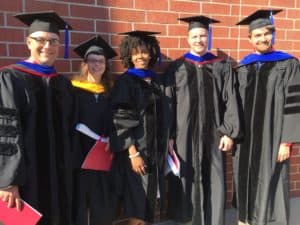
Congratulations to the 2018 Microbiology and Immunology graduates! Pictures (L to R): Dan Voth, Ph.D. (Graduate Director Emeritus), Marissa Fullerton, M.S. ’18, Johnasha Stuart, Ph.D. ’18, Karl Boehme Ph.D. (Graduate Director), Matthew Phillips, Ph.D. ’18.

A very hearty congratulations to the Pechous Laboratory on their R21 grant “Evaluating early host-pathogen interactions in pneumonic plague using an ex-vivo human lung tissue platform” from the NIH (NIAID). Job well done!
Kudos to Amanda Dragan from the Voth Laboratory on having her micrograph of Coxiella burnetti-infected THP-1 cells chosen for the cover photograph for the May issue of Infection & Immunity!
April 2018
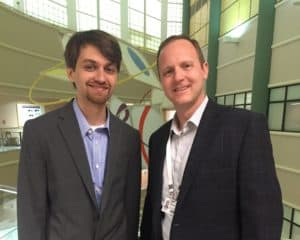
Congratulations to Matthew Phillips from the Boehme Laboratory on the successful defense of his doctoral dissertation entitled “The Function of Reovirus Non-structural Protein σ1s In Viral Replication and Dissemination.” Way to go, Dr. Phillips!
Kudos to Leah Horn from the Stumhofer Laboratory on winning the American Association of Immunologists (AAI) Young Investigator Award at the Woods Hole Immunoparasitology meeting (WHIP). Great job, Leah!
Congratulations to Johnasha Stuart from the Boehme Laboratory on successfully defending her doctoral dissertation entitled “Mechanisms of reovirus serotype-specific type-1 interferon activation”. Job well done, Dr. Stuart!
Congratulations to Willaim MacCain, Leah Horn, and Samantha Huckuntod on being elected President, Vice President, and Secretary, respectively, of the UAMS Graduate Student Association for 2018-2019!
March 2018
Props to Matt Phillips from the Boehme laboratory on having his recent publication in the Journal of Virology selected as a Spotlight article for the April issue! (Plus, a Twitter mention)
Congratulations to our very own Dr. Craig Forrest who came in 53rd out of 931 male runners in the Little Rock Marathon this weekend! In NIH terms, he ran in the 5.7th percentile which is almost good enough for funding …
February 2018
Congratulations to Caylin Winchell (Ph.D. ’16), Amanda Dragan, and the Voth Laboratory on the publication of their paper, “Coxiella burnetii subverts p62/SQSTM-1 and activates Nrf2 signaling in human macrophages” in Infection and Immunity.
A new book chapter from Jacob Latham (M.S. ’17) and the Blevins Laboratory entitled “Generation of Conditional Mutants in Borrelia burgdorferi” was published in Methods in Molecular Biology. Great job Jacob and the Blevins lab!
Congratulations to our newest Ph.D.! Daniel Meeker from the Smeltzer Laboratory successfully defended his doctoral dissertation entitled “Development of a targeted nanotherapeutic approach to the treatment of biofilm-associated Staphylococcus aureus infections.” Job well done, Dr. Meeker!
Kudos to Johnasha Stuart from the Boehme Laboratory on the publication of her paper, “Differential delivery of genomic dsRNA causes reovirus strain-specific differences in IRF3 activation.” in the Journal of Virology.
January 2018
Congratulations to Eduardo Salinas (Ph. D. ’15), Arundhati Gupta, and Jeffrey Sifford (Ph. D. ’16) from the Forrest Laboratory for publication of their paper “Conditional mutagenesis in vivo reveals cell type- and infection stage-specific requirements for LANA in chronic MHV68 infection” in PLoS Pathogens.
Congratulations to Matt Phillips and the Boehme Laboratory on the publication of their paper, “Non-structural protein σ1s is required for optimal reovirus protein expression” in the Journal of Virology.
December 2017
We would like to welcome new MBIM Graduate Students! First-year GPIBS graduate students Susie Brown (Stumhofer Laboratory), Bernice Nounamo (Liu Laboratory), Hayley Theriot (Weinkopff Laboratory), and Nicole Turnage (Forrest Laboratory) joined the Microbiology & Immunology Department.
November 2017
A new manuscript from Joe Rom and the Smeltzer Laboratory entitled “Impact of Staphylococcus aureus regulatory mutations that modulate biofilm formation in the USA300 strain LAC on virulence in a murine bacteremia model” was published in Virulence. Congrats to Joe and the Smeltzer lab!
October 2017
Kudos to Daniel Meeker and the Smeltzer on the publication of their paper “Versatility of Targeted Antibiotic-loaded Gold Nanoconstructs for the Treatment of Biofilm-associated Bacterial Infections” in the International Journal of Hypothermia.
Congratulations to Johnasha Stuart and William MacCain, who received awards at the Graduate Student Research Symposium. Johnasha won first place in the oral presentation category. William won first place for his poster presentation.

Congratulations to Johnasha Stuart, who received the Charles S. McCleskey Award at the American Society for Microbiology (ASM) South Central Branch Meeting, October 20-21, in Little Rock. The McCleskey award is for the outstanding research presentation by a Ph.D. student at the meeting. Congratulations, Johnasha!

Congratulations to Dr. Karl Boehme, who received the Charles C. Randall Award at the American Society for Microbiology (ASM) South Central Branch Meeting, October 20-21, in Little Rock. The Randall Award is given to annually to an outstanding young faculty member from within the geographic boundary of the South Central Branch of the ASM. Dr. Boehme joins Dr. Mark Smeltzer, Dr. Dan Voth, and Dr. Jon Blevins as Departmental faculty members who have received the Randall Award.
We would like to welcome Dr. Steven Conrad as a postdoctoral fellow in Dr. Jia Liu’s laboratory. Dr. Conrad received his B.S. from Purdue University and subsequently worked in the pharmaceutical industry in a variety of areas including, type 2 diabetes, muscle frailty, and infectious diseases. He received his Ph.D. from Western Michigan University, with a focus virology. He comes to UAMS from a previous postdoctoral position at the USDA where he studied avian herpesviruses.
September 2017
Congratulations to Joe Rom and Danielle Atwood from the Smeltzer Laboratory on the publication of their paper, “Impact of Staphylococcus aureus Regulatory Mutations That Modulate Biofilm Formation in the USA300 Strain LAC on Virulence in a Murine Bacteremia Model” in the Virulence.
We are proud to announce the appointment of Dr. Kevin Young as the new chairman of the Department of Microbiology and Immunology. Dr. Young moved to UAMS in 2009 from the University of North Dakota and has been a Professor in the Department since that time. Congratulations Dr. Young!
Congratulations to Katelynn Doiron, Clay Litteken, and Joe Rom who successfully defended their qualifying exams and are now full-fledged Ph.D. candidates in the Department of Microbiology & Immunology!
August 2017
Congratulations to Dr. Richard Morrison on his appointment as the Executive Associate Dean for Research for the UAMS College of Medicine. Dr. Morrison has served as the chairman of the Department of Microbiology and Immunology since 2007. He will remain a member of the Department faculty and continue his research and teaching efforts. We wish him the best of luck in his new position!
Publication of a new study from Bernice Nounamo and the Liu laboratory “Myxoma Virus Optimizes Cisplatin for the Treatment of Ovarian Cancer In Vitro and in a Syngeneic Murine Dissemination Model” in Molecular Therapy Oncolytics.
July 2017
Congratulations to Aru Gupta and the Forrest Laboratory on the publication of their paper, “Murine Gammaherpesvirus 68 Expressing Kaposi Sarcoma-Associated Herpesvirus Latency-Associated Nuclear Antigen (LANA) Reveals both Functional Conservation and Divergence in LANA Homologs” in the Journal of Virology.
June 2017
Congratulations to Aru Gupta who received a Student Travel Award from the American Society for Virology to attend the Annual Meeting in Madison, WI.
May 2017
Kudos to Dr. Dan Voth on receiving an R21 grant from the National Institutes of Health for “Characterization of the human lung response to Coxiella burnetii“!
Congratulations to Dr. Mark Smeltzer and the Center for Microbial Pathogenesis and Host Inflammatory Responses (CMPHIR), on being awarded Phase II funding from the NIH through the Centers of Biomedical Research Excellence (COBRE). The award totaling $11 million dollars over 5 years provides funding for research related to the pathogenesis of, and immune responses to, microbial diseases. The CMPHIR was established in 2012 with a Phase I award through the COBRE and the new funds will allow those efforts to continue through 2022.
April 2017
Tiffany Weinkopff, Ph.D., has joined the Department of Microbiology and Immunology as an Assistant Professor. Dr. Weinkopff earned her Ph.D. at the University of Georgia. She completed her postdoctoral training with Phillip Scott, Ph.D., at the University of Pennsylvania. Dr. Weinkopff’s laboratory will focus on defining host immune responses to Leishmania. Welcome, Dr. Weinkopff!
March 2017
Congratulations to Bernice Nounamo and the Liu Laboratory on the publication of their paper, “An interaction domain in human SAMD9 is essential for myxoma virus host-range determinant M062 antagonism of host anti-viral function” in Virology.
January 2017
Welcome new MBIM Graduate Students! First-year GPIBS graduate students Amanda Dragan (Voth Laboratory), Samantha Huckuntod (Pechous Laboratory), Aura Ramirez (Smeltzer Laboratory), and Dina Zita (Boehme Laboratory) joined the Microbiology & Immunology Track.
April 2016
Congratulations to Daniel Meeker who was awarded $500 for the New Investigator Travel Award at the 2016 International Congress of Hyperthermic Oncology (ICHO) in New Orleans, LA. Daniel’s abstract titled “Designing novel antibiotic-loaded, targeted nanoparticles to eradicate Staphylococcus aureus planktonic cultures and biofilms” was also selected for an oral presentation.
Congratulations to Jacob Latham who won second place in the Graduate student poster section at the 6th Annual UAMS Student Research Day held April 13, 2016, on campus in the I. Dodd Wilson Educational building. Jacob’s poster was titled “Assessing differential gene regulation triggered by environmental temperature in Borrelia turicatae.”
New Ph.D. Graduates
Kerry Evans successfully defended her dissertation on April 7, 2016 titled “Peptidoglycan modifications in Escherichia coli are monitored by the Rcs phosphorelay, the Cpx pathway, and the Tol-Pal complex” under her advisor Dr. Kevin Young. Kerry has joined the Office of Grants and Scientific Publications (OGSP) here at UAMS as a Research Associate under the direction of DeAnn Hubbard. Kerry works with UAMS investigators to develop manuscripts and grant proposals for external research funding by providing writing and editing support along with consultation and guidance.
Jeffery Sifford successfully defended his dissertation on April 25, 2016, titled “Gammaherpesvirus interactions with tumor suppressor p53” under his advisor Dr. Craig Forrest. Jeff will pursue his postdoctoral research in the laboratory of Dr. Junmin Peng at St. Jude Children’s Research Hospital beginning August 15, 2016. Research in Dr. Peng’s lab focuses on applying systems biology approaches to better understand neurodegenerative diseases and developing new technologies for mass spectrometry.
New Faculty (March 2016)
Roger Pechous, Ph.D., has joined the Department of Microbiology and Immunology as an Assistant Professor. Dr. Pechous earned his Ph.D. at the Medical College of Wisconsin in 2008. He completed his postdoctoral training with William Goldman, Ph.D., at the University of North Carolina at Chapel Hill. Dr. Pechous’s research program focuses on the pathogenesis of pneumonic plague. He is interested in identifying factors that contribute to the severity of infection, particularly the role of host inflammatory responses
New Ph.D. Graduate
Eduardo Salinas successfully defended his dissertation on November 19, 2015, titled “Elucidating LANA’s Roles during Gammaherpesvirus Pathogenesis” under his advisor Dr. Craig Forrest. Eduardo will pursue his postdoctoral research in the laboratory of Dr. Tem Morrison at the University of Colorado Anschutz Medical Campus beginning August 15, 2016. Research in Dr. Morrison’s lab focuses on defining how arthropod-borne viruses and parasites cause disease.
New Ph.D. Graduates (February 2016)
Allister Loughran successfully defended his dissertation on February 29, 2016, titled “The role of sarA and proteases in defining Staphylococcus aureus as an orthopedic pathogen” under his advisor Dr. Mark Smeltzer. Allister has accepted a postdoc position at St. Jude Children’s Research Hospital in Memphis, TN, he will be joining the lab of Dr. Elaine Tuomanen, MD studying the molecular pathogenesis of Streptococcus pneumoniae invasion and inflammation.
Danielle Fortune successfully defended her dissertation on August 20, 2015, titled, “Investigating virulence determinants in Lyme disease spirochete, Borrelia burgdorferi,” under her advisor Dr. Jon Blevins. Danielle was accepted into the SPIRE postdoctoral training plan at the University of North Carolina at Chapel Hill and, in September 2015, she joined the lab of Dr. Rita Tamayo studying pathogenesis and gene regulation in Clostridium difficile.
Congratulations (December 2015)
Congratulations to Daniel Wikenheiser, Elizabeth Naglak and Matthew Phillips on their awards at the Southeast Regional IDeA Meeting in Biloxi, MS on November 13, 2015. Daniel Wikenheiser received an award and $500 for 1st Place in the Graduate Poster Competition for his poster titled “Memory Tfh cells promote rapid Ab production following secondary Plasmodium infection.” Elizabeth Naglak and Matthew Phillips tied for 2nd place in the Graduate Poster Competition, each received an award and $250. Naglak’s poster was titled “Optimal Antibody-Mediated Immunity to Chlamydia Genital Infection Requires IFNγ Activation of an Effector Cell Population.” Phillips’ poster was titled “Non-structural protein sigma 1s enhances reovirus replication in endothelial cells.”
Congratulations (October 2015)
Dr. Jon Blevins, an Associate Professor in the Department of Microbiology and Immunology, was elected the Vice President/President-elect of the South Central Branch of the American Society for Microbiology (ASM). The ASM, which is a professional organization for scientists in the microbial sciences, is the oldest and largest life science membership organization in the world. The South Central Branch of the national ASM, founded on 1947, was established to support networking and collaboration of microbiologists in Arkansas, Mississippi, and Louisiana. As Vice President/President-elect, Dr. Blevins will participate in governance, financial administration, and reporting of the South Central Branch, as well as the organization of the annual regional meetings. Dr. Blevins’ term begins in 2016 and will run for four consecutive years.
New Faculty (August 2015)
Lin-Xi Li, Ph.D., joined the Department as an Assistant Professor. Dr. Li earned her Ph.D. at the University of Minnesota in 2009. She completed her postdoctoral training with Stephen McSorley, Ph.D., at the Center for Comparative Medicine at the University of California Davis. Dr. Li’s research program focuses on the host adaptive immune responses to Chlamydia female reproductive tract infection.
New Awards and Announcements
Mark Smeltzer, Ph.D. (PI) received funding June 15, 2015, from National Institute of Health for his project titled “Impact of Staphylococcus aureus in osteomyelitis and bone physiology.” This 5-yr award worth a little over $1.8 million will focus on defining the S. aureus virulence factors responsible for the extensive bone destruction and remodeling seen in osteomyelitis and the mechanistic basis by which these virulence factors drive these processes.
Jon Blevins, Ph.D., has been awarded a two-year grant of more than $400,000 by the National Institutes of Health to study the genetics of Borrelia burgdorferi, the bacterium that causes Lyme disease. The goal of the research is to identify specific genes required by B. burgdorferi to live in a mammal or a tick. Through genetic manipulation, certain genes believed to help the bacteria adapt, especially during infection and transmission, can be mutated to inactivate individual genes. If the mutated bacterium then either fails to grow or cause infection, this gene is likely very important to the bacterium. Knowing the identities of these essential bacterial genes could give scientists a better understanding of how to prevent infection or treat Lyme disease.
Chia Lee, Ph.D., has been awarded a five-year grant of more than 1.7million by the National Institute of Health for his project titled “Virulence gene regulation in Staphylococcus aureus.” Staphylococcus aureus is an important human pathogen that produces many virulence factors that are regulated by an equally impressive number of regulators. How virulence factors are regulated is not fully understood. The major goals of this project are to advance our understanding of how these virulence factors are regulated and to define the contribution of virulence regulation to staphylococcal pathogenesis.
Congratulations to Caylin Winchell who received a Travel Award from the FASEB MARC program which was presented at the American Association of Immunologists 2015 Annual Meeting. The poster she presented was titled “Manipulation of macrophage autophagy by Coxiella burnetii.”
Karl Boehme, Ph.D. received an R56 award from the National Institutes of Health for his project entitled “Mechanisms of reovirus bloodstream dissemination”. This is a High Priority, Short-Term project grant for one-year of funding worth over $350,000. The award will fund research to understand how viruses gain access to the bloodstream, which is a fundamental step in the development of many viral diseases.
New Ph.D. Graduates
Joseph Graham successfully defended his dissertation on April 16, 2015, titled “Defining the Human Alveolar Macrophage Response to the Q Fever Agent, Coxiella burnetii” under his advisor Dr. Dan Voth. Joseph has joined the laboratory team of Dr. Matt Welch at the University of California, Berkeley.
Justin Graham successfully defended his dissertation on April 28, 2015, titled “Trapping and identification of cellular substrates of the chaperone ClpC and determining how they regulate virulence genes in Staphylococcus aureus” under his advisor Dr. Chi Lee. Justin will be joining the laboratory team of Dr. Matthew Wolfgang at the University of North Carolina at Chapel Hill September 1, 2015. Dr. Wolfgang’s lab is focused on Pseudomonas aeruginosa pathogenesis.
Celebrated Careers
The Department of Microbiology and Immunology recently celebrated the careers of Professors Roger G. Rank, Ph.D. and Marie Chow, Ph.D.


The Department of Microbiology and Immunology and colleagues throughout UAMS celebrated the 22 years of distinguished service of Marie Chow, Ph.D., at a June 16 reception. Above right: Dr. Chow smiles as fellow faculty members pay tribute. Recently retired Roger Rank, Ph.D., (above left, and with UAMS colleagues in the photos below) joined in the celebration.
Dr. Rank joined UAMS in 1976 and served as a Professor in the Department of Microbiology & Immunology (MBIM) until May of 2015. Dr. Rank also served as the Interim Chair of MBIM from 1991-1992 and was the Chair from 1992-2007. During his tenure at UAMS, Dr. Rank was awarded Red Sash Award 10 times, the Golden Apple Award in 2009 and the Gold Sash Award in 2010, 2011 and 2012. He served and chaired on numerous local and international committees, including the Scientific Advisory Committee at Arkansas Children’s Hospital. Dr. Rank was a prolific writer, authoring 113 peer-reviewed publications and numerous book chapters and reviews.
“Under Dr. Rank’s leadership the department grew both in faculty number and extramural grant support. He led by example, maintaining a continuously funded laboratory until his retirement. His contributions to UAMS, MBIM and the extramural scientific community will be missed,” said Microbiology and Immunology Chair Richard. P. Morrison, Ph.D..
Dr. Chow was recruited to the UAMS Department of Microbiology and Immunology (MBIM) in 1993, and served as Professor in both MBIM and Pathology until June 2015. She held multiple positions during her tenure, including serving as the Associate Director for Shared Resource, Winthrop P. Rockefeller Cancer Institute and as the Interim Director of UAMS BioVentures from 2013 to 2015. Other UAMS departmental and institutional administrative responsibilities include, Graduate Program Admissions Committee 1993-2015, Director of Graduate Program 1994-2001 and 2008-2015, UAMS Patent and Copyright Committee 1991-2006, Consortium founding member 1993-1999 and Medical School Admissions Interviewer 1997-2005 and 2008-2015, just to name a few.
“Dr. Chow worked tirelessly on behalf of UAMS. Her passionate approach to mentorship of junior faculty, not only in our department but across campus, had a profoundly positive impact on their careers. I will miss Marie’s candid, and often spot-on, discussions” said Dr. Morrison.
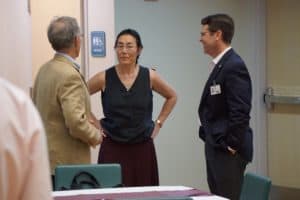
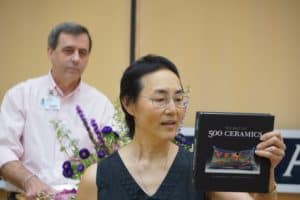

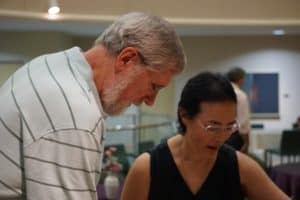

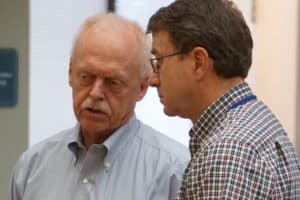
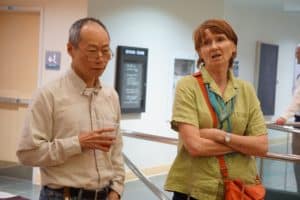
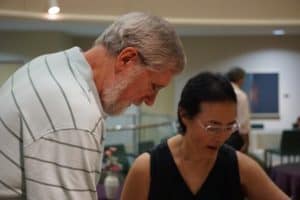
March 12, 2015
Congratulations to graduate students, Joey Graham and Elizabeth Naglak on their awards at the South Central Branch of the American Society of Microbiology Conference, held September 2014. Graham received the Charles S. McCleskey Award for Best Graduate Student Oral Presentation for “The living human lung: A model for Coxiella burnetii pathogenesis.” Naglak won second place in the poster presentation for “Interferon-gamma is necessary for optimal antibody-mediated protective immunity to Chlamydia muridarum genital infection.”
Jason Stumhofer, Ph.D. (Assistant Professor) and Craig Forrest, Ph.D. (Assistant Professor) were the recipients of a Medical Research Endowment Award for their collaborative work on “B cell progenitors as a latent reservoir for MHV68 infection.” This one year award, which began January 1, 2015, investigates a recent discovery by Dr. Stumhofer’s lab of a B cell progenitor population that expands in the spleen of mice during Plasmodium infection. Further research has shown that inflammation after a number of infections can induce this population to expand and differentiate into B cells, including infection with the mouse gammaherpesvirus MHV68, which Dr. Forrest’s lab investigates. As this virus preferentially establishes latent infection in B cells, they hope to determine if the virus utilizes this expanding B cell progenitor population as a means to establish a latent infection.
Usha Ponnapan, Ph.D. (Professor) is the Co-Investigator on a VA Rehabilitation R&D Award with Dennis Richard, Ph.D. (PI). This grant, “Immune function and muscle adaptations to resistance exercise in older adults” began August 2014 and is a four year award. Dr. Ponnapan and Dennis will conduct a double-blind randomized trial of a nutritional supplement (Muscle Armor) to determine if the supplement boosts gains in muscle mass, strength, and function for older adults during resistance exercise training by dampening inflammation so that the immune system is stimulated to support muscle growth and maintenance.

